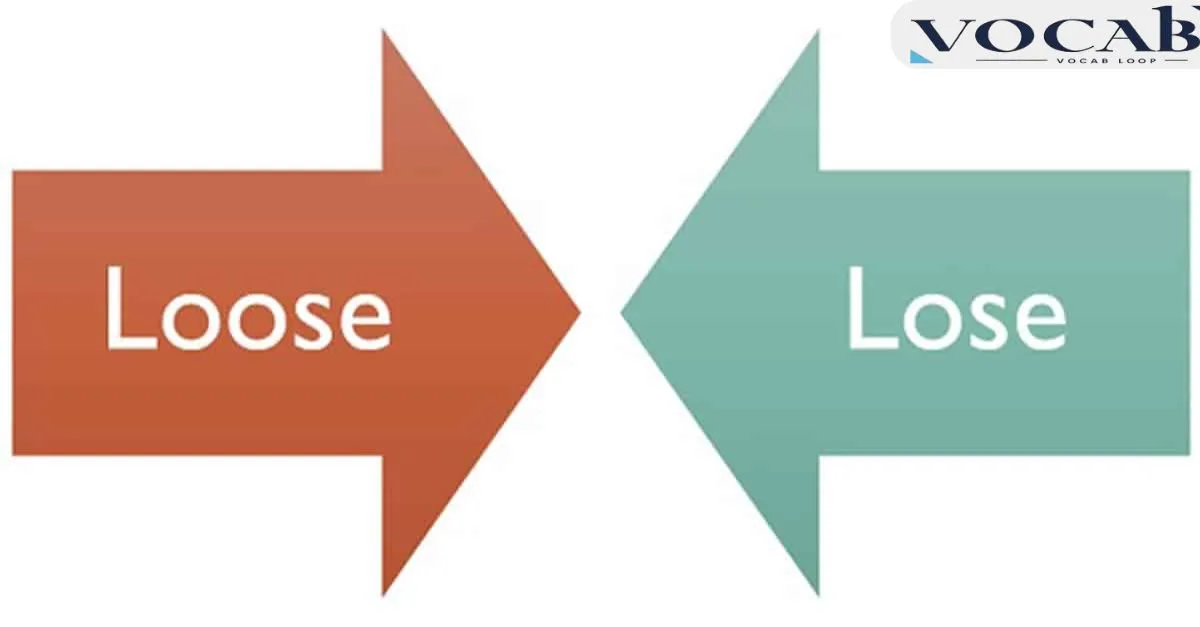The difference between loosing and losing is essential, especially in writing. Many people mix up these two words, creating confusion due to their similar spelling and sound. Though they look almost alike, loosing and losing have distinct meanings and uses. Knowing when to use each term can improve clarity and help you sound more professional.
This article will cover their meanings, grammar rules, and usage examples, so by the end, you’ll have a clear idea of how to use each correctly.Let’s dive into why loosing or losing are often confused, what they each mean, and how you can remember their proper usage in everyday language.
What is the Confusion? Loosing or Losing?

The confusion between loosing and losing arises because they look and sound alike. Losing is the present participle of “lose” and means to misplace something or fail to win, like losing a game, weight, or an object. In contrast, loosing comes from “loose,” meaning to release or make less tight.
Although loosing is less common in everyday language, it’s still important in specific contexts, like loosing an arrow or loosening a knot. While both are verbs, they describe different actions: losing is the “act of loss,” and loosing is the “act of loosening.”
Is the Loosing Word Correct?

Loosing is indeed a correct word, but it’s not as frequently used as losing. Loosing is a form of the verb “loose,” meaning “to release” or “to make something less tight.”
For instance, you might hear someone say, “He’s loosing the ropes,” which means he is making the ropes looser or setting them free.
Definition of “Loosing”
The definition of loosing is “the act of making something loose or freeing it.” This word typically appears in formal or specific contexts, such as in historical writing or in certain professions.
Meaning of “Loosing”
The meaning of loosing involves actions like setting free, untying, or loosening. For example, in medieval literature, “loosing arrows” refers to releasing arrows from a bow.
Is the Losing Word Correct?

Yes, losing is a very common word in English. It’s the present participle of “lose” and is widely used in everyday language. You use losing when talking about the act of loss, whether it’s losing a game, misplacing an object, or failing at something.
Definition of “Losing”
The definition of losing is “the act of failing to win, misplacing something, or experiencing a loss.” It’s used in numerous contexts, from sports to personal losses.
Meaning of “Losing”
The meaning of losing centers on failure, misplacement, or not succeeding. For example, “She’s losing interest in the project” means her enthusiasm is diminishing.
Quick Summary: Loosing or Losing?
losing is commonly used in daily contexts and refers to misplacing something, failure, or not keeping something. Loosing, however, is more specific and means releasing or loosening something.
The correct term depends on the context, if you’re talking about failure, use losing; if you’re referring to making something loose, use loosing.
| Term | Meaning | Usage Example |
| Loosing | Making less tight | “He’s loosing the strings.” |
| Losing | Failing or misplacing | “She’s losing the game.” |
Loosing or Losing as Parts of Speech
Both loosing and losing act as verbs, but they function differently in sentences. Loosing comes from “loose,” while losing comes from “lose.” This difference in parts of speech gives each word a unique role in writing and speech. Losing is more common and describes everyday situations, while loosing is specific to actions involving releasing or loosening objects.
Pronunciation of Loosing or Losing
To avoid confusion, it helps to know their pronunciation. Losing is pronounced /ˈluːzɪŋ/, with a “z” sound, while loosing is pronounced /ˈluːsɪŋ/, with an “s” sound. Pronouncing these words correctly can help with grammar usage and prevent common errors in spoken English.
Loosing in British English and American English
In British English and American English, loosing is not as commonly used as losing. However, in certain formal or historical contexts, loosing might appear more often. For example, older British literature may use “loosing” in phrases like “loosing arrows” in reference to archery.
Losing in British English and American English
Losing is widely used in both British English and American English without significant variation. Its meaning remains the same: it’s about misplacing, failing, or experiencing loss. This common usage makes it easy to understand across different English-speaking regions.
Loosing or Losing: What’s the Difference?

The key difference between loosing or losing lies in their meanings. Losing refers to the act of loss, while loosing involves the act of loosening. When you talk about losing something, you mean it’s gone or failed. Loosing, on the other hand, is about releasing or setting something free.
Loosing or Losing: Grammar
Losing is a more frequent verb form, describing everyday actions like losing items or losing competitions. Loosing is less common but grammatically correct. It follows the verb structure of making something loose.
Losing: A Common Verb
Losing is a common verb in everyday usage, describing many types of loss. In sports, relationships, or tasks, losing is an everyday part of the language. You might say, “I am losing patience” or “We are losing time.”
Loosing: Less Common, But Still Important
Although loosing is less common, it plays a role in specific contexts, like loosening a grip or setting something free. For example, “He was loosing his grip on the rope” means he was releasing his hold.
Examples of How to Spell Loosing or Losing

To avoid mistakes, here are examples to clarify correct spelling in different situations:
Loosing:
- “They are loosing the sails for the voyage.”
- “He was loosing the chains holding the gate.”
Losing
- “She’s losing interest in the discussion.”
- “They kept losing track of the time.”
In Different Contexts Losing
Losing can apply to numerous contexts. You might lose a job, lose control, or lose a game. This versatile verb expresses misplacement and failure across multiple situations.
Loosing in Different Contexts
Loosing fits more specific contexts. It’s used when describing actions like loosening or releasing. Examples include loosing a tie or loosing arrows in archery.
Spelling Mistakes in Loosing or Losing
Spelling mistakes between loosing or losing are common, especially in informal writing. Many confuse the two due to similar spellings. But keeping the meanings clear can help prevent these writing mistakes.
Team Up with Friends and Make Studying Fun
One way to remember the difference is to study with friends. Practicing words like loosing and losing together can make learning easier and more enjoyable.
Misuse of Losing
Sometimes, people misuse losing to mean loosening. This error can lead to grammar mistakes in sentences, confusing readers.
Misuse of Loosing
Similarly, people might misuse loosing when they mean losing. Knowing the proper word to use can prevent such common errors.
Loosing or Losing: Remembering the Differences
To remember the difference, think of losing as related to loss and loosing as connected to loosening.
Losing is About Loss
The word losing focuses on loss, whether it’s a game, object, or opportunity. If you experience absence or failure, “losing” is the right choice.
Stay Organized and Focused with Your Smart To-Do List
A smart to-do list can help keep track of tricky word pairs like loosing or losing, improving writing skills.
Loosing is About Loosening
Loosing describes actions of loosening, like making ropes less tight or freeing** an object.
Which One is More Acceptable: Loosing or Losing?
In regular language, losing is more commonly accepted and widely used.
Origins of Loosing or Losing

Understanding the origins of loosing and losing can help clarify their meanings and why they’re sometimes confused.
Loosing
The word loosing originates from the Old English word lēosan, which means “to loosen” or “to set free.” Over time, loosing evolved to describe the action of making something less tight, often referring to physical objects or metaphorical bindings.
In medieval English, “loosing arrows” meant releasing arrows from a bow, and in religious texts, it sometimes referred to setting someone free from a burden.
Losing
Losing comes from the Old English term losian, meaning “to lose” or “to suffer loss.” Historically, losing has been used to describe both the physical misplacement of objects and the failure to win in competitive contexts.
Over centuries, it has retained its connection to the concept of loss, whether emotional, material, or competitive.
Synonyms of Loosing or Losing
Here are synonyms to expand vocabulary.
Loosing
- Releasing
- Unfastening
- Untying
- Detaching
- Relaxing
- Freeing
- Unleashing
- Loosening
- Letting go
- Setting free
Losing
- Failing
- Misplacing
- Missing
- Dropping
- Forfeiting
- Falling behind
- Leaving behind
- Surrendering
- Yielding
- Mislaying
Sentences in Daily Usage of Loosing or Losing
“Loosing” in Sentences
- He was loosing the ropes to let the boat drift away.
- The archers were loosing their arrows at the approaching target.
- She found herself loosing the knots she had carefully tied.
- As the day warmed up, the climbers started loosing their jackets.
- The general gave the order for loosing the troops from formation.
- In the story, the hero is loosing his fears and embracing courage.
- The caretaker was loosing the animals from their pens for feeding time.
- Loosing the sails allowed the boat to pick up speed in the wind.
- She kept loosing her hair from the tight bun as it gave her a headache.
- The crew was busy loosing cargo that had been tightly secured.
“Losing” in Sentences
- She was upset about losing her favorite bracelet.
- The team kept losing every match this season.
- He realized he was losing interest in the project.
- They are worried about losing the company’s market position.
- She’s been losing sleep over the stressful situation at work.
- He’s constantly losing his keys around the house.
- The patient was concerned about losing weight unexpectedly.
- They were on the verge of losing the game after a poor performance.
- Losing focus during the exam cost her a few marks.
- Many people are afraid of losing control in difficult situations
FAQs
What’s the difference between loosing and losing?
Losing means misplacing or failing; loosing means freeing or making loose.
Is “loosing” a real word?
Yes, it’s a lesser-used word that means to loosen.
How can I remember the spelling?
Use “lose” for loss, and “loose” for loosen.
Why is there confusion?
Similar spelling and sounds cause mix-ups.
Are both words acceptable?
Yes, but losing is more commonly used.
Conclusion
The words loosing and losing may look similar, but their meanings and uses are distinct. Losing relates to loss or failure, while loosing means releasing or loosening something.
By understanding the key differences and practicing their proper use, you can avoid common mistakes and improve your English grammar skills.

Alex Hormozi is a seasoned blogger at Vocab Loop, known for his deep insights into language, vocabulary, and grammar. With years of experience in writing, Alex shares practical tips and effective strategies to help readers improve their linguistic skills and enhance their writing abilities.

